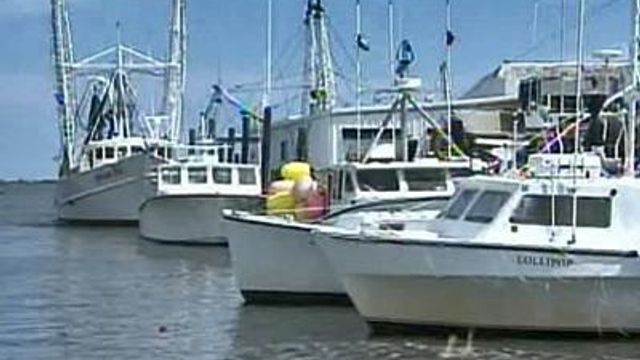Beachgoers Stay, Officials and Businesses Prepare as Gabrielle Approaches
Residents and vacationers alike were not frightened by the approach of Tropical Storm Gabrielle to the Outer Banks. Along with choppy surf, rain and high winds, the storm could also bring much-needed rain to the drought-stricken region.
Posted — UpdatedResidents said their parched area could use the rain. A low-grade tropical storm didn't faze them.
"When people hear about tropical storms, they assume houses are going to fall in the ocean," said Margot Jolly, a lifeguard with Nags Heads Ocean Rescue. "They shouldn't overreact like that. Just relax, stay inside, and have a little hurricane party."
"Most people around here are pretty wise," said D.W. Harris, 74, of Coastal Heights, Virginia, who has a vacation home on Roanoke Island. "They're not too worried about it."
Local officials who talked to WRAL reporters said there is a low level of anxiety about Gabrielle. Butch Parrish, mayor of Topsail Beach, said the town has an emergency plan, but he doubts the storm will be severe enough to warrant implementing it.
Parrish's initial advice to residents was to bring your garbage cans in.
Throughout the Outer Banks, officials urged residents and visitors to secure loose items outside their homes and to remain indoors. The National Park Service closed all campgrounds on the Cape Hatteras National Seashore.
Along the southernmost islands that lie in Gabrielle's potential path, WRAL reporters saw vacationers and residents swimming, boating and fishing as Saturday drew to a close.
For beachgoers, the storm's greatest danger will come from rough seas, reaching 8 to 11 feet on the ocean side of the central Outer Banks, and rip currents along the shore.
"Only experienced swimmers should be in the water, but even then, with the high risk of a rip current, people should really just stay out of the water," said Michael Caropolo, a forecaster with the National Weather Service in Wilmington. "Surfers love to stay out in the water, but they generally know what they're dealing with."
The choppy surf forced vacationer Bill Rehl to keep close tabs on his granddaughters while they were swimming.
"You have to be very careful. We made sure we held their hands," Rehl said. "We didn't go out past their knees because the surf was getting pretty rough. It's got a constant tow that was towing you down the beach."
Rip currents are more a threat during low tide, said David Elder, head of the Kill DevilHills Ocean Rescue Squad which is patrolling the beach and keeping an eye on the ocean and beachgoers.
Gabrielle is expected to hit during low tide, around 2 p.m. Sunday, increasing the risk of rip currents, but that danger will diminish, Elder said.
"Once the tide turns, the currents tend to fill in a little bit," he said. "The water starts to flow more easily back and forth over the bar, making it a little bit of a safer beach."
The storm could also bring much-needed rain to the area. Dare County is in a severe drought, while Pender and Olsow counties are in an exteme drought. Dare County's rainfall total is 19 inches behind for the year, and Pamlico County is behind 11 inches.
"The latest models show we'll get some rain, which we desperately need and 30-50 mph winds, which here at the Outer Banks, we're sued to that," resident Karen Warlitner said.
Dare County emergency management officials said their main concern is flooding on the sound-side of the islands. Pamlico County officials said the Pamlico River could rise as much as 3 feet, but because of the drought, they did not expect any severe flooding.
Dare County officials said the most recent forecast - which has Gabrielle passing to the east - will help alleviate flooding, by keeping the stronger winds off shore.
"That's a good forecast for us," Sandy Sanderson, Dare's emergency-management director, said. The western sound side of the islands, then, will "only ... get the wrap-around and sound-side winds of maybe 25-30 mph," he said.
The postponement of the Atlantic Beach King Mackarel Fishing tournament has already had a trickle-down effect on the economy, with hotel reservations cancelled and fewer people in restaurants.
County officials said they hope people will come back to the tournament, re-scheduled for Oct. 18-20. The tournament usually pushes $500,000 into the economy, officials said.
Fisherman William Brown, who's based out of the village of Wancheese, said the storm doesn't frighten him, but he's annoyed by the loss of business it's causing him.
"It's just churning the water up," Brown said. "After a big storm, you get out there, and the ocean turns to mud, pretty much."
Topsail Island officials said they hoped Gabrielle would not cause much beach erosion on the island, which has seen lots of sand ripped away by past storms.
Pamlico County officials said that while they're keeping an eye on potential trouble spots for beach erosion, they don't expect the waves there to get any worse than they have been.
Forecasters said the storm was likely to strengthen before brushing the Outer Banks on Sunday afternoon. But there were no indications Gabrielle would become a hurricane before turning north and curving back out into the Atlantic.
"It's not going to be one that will go down in the annals of the record books," said Caropolo.
Gabrielle formed along an old frontal boundary that stalled about midway between the Southeast coast and Bermuda, drawing the attention of coastal residents for the past few days. It finally spun into a storm late Friday evening.
Gabrielle had initially formed as a subtropical storm, which is a hybrid system and typically weaker than hurricanes. They share the characteristics of tropical storms, which get their power from the warm ocean, as well as storms that form when warm and cold fronts collide.
• Credits
Copyright 2024 by WRAL.com and the Associated Press. All rights reserved. This material may not be published, broadcast, rewritten or redistributed.





